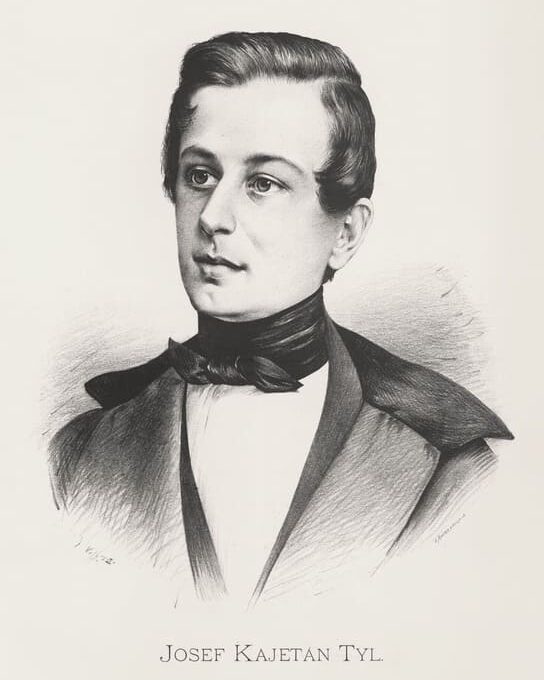Table of contents Show
Josef Kajetán Tyl (1808-1856) was an essential player in the history of Czech theatre and a renowned patriot amid the Czech National Revival. Let us look at the life and professional life of Josef Kajetán Tyl, a fascinating individual who made an unforgettable impression on the cultural setting of his day.
Tyl’s plays were more than just entertaining; they were also a form of protest against his time’s harsh political and cultural circumstances. He worked to celebrate the Czech language, heritage, and identity, thereby preserving and promoting his people’s rich legacy. Therefore, his accomplishments as a dramatist, actor, and writer contributed to the formation of Czech cultural distinctiveness when the imposing Austrian Empire threatened the Czech language and way of life.
Tyl was also an early trailblazer in the field of theatrical production. His work founding the first Czech professional theatre company was crucial in taking Czech theatre to the next level of artistic greatness. Tyl’s daring artistic vision and groundbreaking staging techniques revolutionized Czech theatre and inspired subsequent generations of artists.
Who Was Josef Kajetán Tyl?
Playwright, actor, and writer Josef Kajetán Tyl (1808–1856) was an integral part of the Czech National Revival, an effort to revitalise Czech identity, language, and culture when it was under the rule of the Austrian Empire. In his more than 50 plays, Tyl—who was born in Kutná Hora—celebrated Czech history, culture, and social concerns. The song “Kde domov můj” subsequently became the Czech national anthem and was incorporated in his best-known composition, Fidlovačka.
In an era when German was officially recognised as the language of business, Tyl became an outspoken supporter of the Czech language because of his commitment to using it in his writing and performances. As a journalist, Tyl helped disseminate nationalist ideology through his writings. He is honoured as a cultural hero and a patriot and remembered as a key player in the Czech National Revival and the birth of Czech theatre.
Notable Works of Josef Kajetan Tyl
Josef Kajetan Tyl’s plays explored patriotism, historical events, social justice, and Czech folklore. His work and passion for the Czech language contributed to fostering Czech nationalism.
Overview of his key plays
This play is notable for Tyl’s song “Kde domov můj” (Where is My Home), which later became the Czech national anthem.
This is his most popular and enduring play. The narrative follows Švanda, a bagpiper who seeks money but ultimately finds satisfaction in his hometown.
- “Jan Hus” – 1848
Jan Hus, a 15th-century Czech religious reformer and martyr, inspired this historical play. Tyl linked Hus’s biography to modern Czech nationalism by depicting him as resilient against foreign rule.
- “Kutnohorští havíři” (The Miners of Kutná Hora) – 1848
This social drama highlights Tyl’s hometown, Kutná Hora miners’ problems. It shows Tyl’s passion for social justice and the working class, confronting economic inequality and glorifying Czech dignity and resilience.
Czech National Anthem contribution
Tyl penned “Kde domov můj” in Fidlovačka, which František Škroup composed (music). The song’s lyrics express love for the Czech Republic’s natural beauty and national pride.
Czech theatre: Themes, style, and influence
- National identity and patriotism
Tyl’s works resonate with Czech nationalism. His plays emphasise Czech culture, splendour, and solidarity against foreign rule.
- Social justice and folklore
In his plays, Tyl often included Czech folklore and fairy stories, such as Strakonický dudák. This utilisation of folklore entertained and promoted Czech rich culture.
- The romantics and realism
Tyl blended reality with romanticism. His mass-appealing plays depicted normal people and everyday affairs, but they were also romanticised and idealised about the Czech nation and its principles.
- Czech theatre influence
Tyl elevated Czech theatre and language by writing and acting in Czech, while German dominated the arts. He helped shape Czech theatre by utilising theatre to promote social and national awareness, inspiring subsequent playwrights and artists.
The Josef Kajetan Tyl Theatre in Pilsen
The acclaimed Josef Kajetán Tyl Theatre in Pilsen, Czech Republic, honors the famous Czech writer and hero. Its founding in 1865 symbolized the Czech National Revival’s promotion of Czech culture and theatre during a time of national awakening.
- Historical significance
The Josef Kajetan Tyl theatre was constructed during the revival of the Czech language and culture after centuries of German rule under the Habsburg Empire. The homage to Tyl honours his vital role as an advocate for Czech theatre and language.
The Municipal Theatre of Pilsen was renamed to honour Tyl, who modernized the Czech theatre and preserved Czech culture.
- Role in promoting Czech Culture
The Josef Kajetán Tyl Theatre has been a key contributor to Czech culture, encouraging the arts and maintaining Czech identity. It plays classic plays by Tyl and other Czech playwrights, modern works, operas, and ballets in Czech. Like Tyl’s works, the theatre promoted national pride and solidarity.
- Connection to Tyl’s legacy
The theatre takes its name from one of the most significant personalities in Czech theater, and symbolizes Tyl’s vision of using art and theater to strengthen national identity. The theatre promotes Josef Kajetán Tyl’s values of Czech language, culture, and national pride through its shows.
Josef Kajetan Tyl’s Contributions to Opera
Through his literary works and collaboration with composers, Josef Kajetán Tyl shaped Czech opera. Though well renowned for playwriting, Josef Kajetán Tyl’s opera influence shaped early Czech national opera.
Collaborations with composers
Tyl’s most notable collaboration was with musician František Škroup, who adapted his lyrics for “Kde domov můj” to music. This song, introduced in Tyl’s play Fidlovačka (1834), is now the Czech national anthem and a landmark in Czech music.
Josef Kajetán Tyl collaborated with composers to create operas and plays honoring Czech history, folklore, and national pride, in addition to “Kde domov můj”.
Influence on Czech Opera
Tyl’s literary writings shaped Czech opera by adding themes of nationalism, folklore, and historical figures. His emphasis on Czech language and culture helped distinguish Czech opera from German-speaking traditions.





